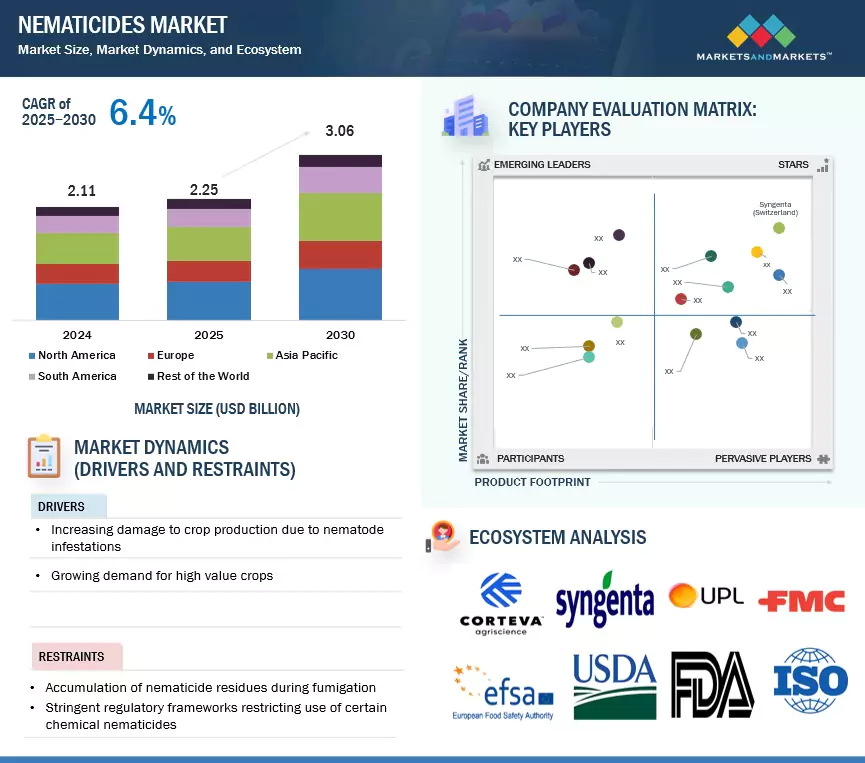Nematicide Market Size, Latest Trends, Key Segments, Opportunities, Top Companies, Recent Developments, Industry Analysis, and Forecast – 2030
The nematicides market is projected to reach USD 3.06 billion by 2030 from USD 2.25 billion in 2025, at a CAGR of 6.4% from 2025 to 2030. The nematicides market is driven by increasing crop losses caused by plant-parasitic nematodes, rising demand for high-value crops such as fruits, vegetables, and plantation crops, and the growing need to improve yields on limited arable land. Advances in seed-applied treatments, precision agriculture, and integrated pest management (IPM) have enhanced the effectiveness of nematode control, while stricter regulations on chemical fumigants are accelerating the adoption of bio-based alternatives. Additionally, continuous product innovations, supportive government policies, and strategic investments by agrochemical companies are further contributing to market growth.

Nematicides Market Drivers: Increasing damage to crop production due to nematode infestations
The global food crop production is increasingly impacted by various pests, including fungi, bacteria, viruses, insects, nematodes, and weeds. According to CropLife India, the majority of global crop losses are attributed to 10,000 insect species, 30,000 weed species, 100,000 plant diseases, and 1,000 species of nematodes. Nematodes, in particular, pose a significant threat as they damage root systems and reduce nutrient uptake, negatively impacting plant health. The Food and Agriculture Organization (FAO) reports that pests, including nematodes, contribute to 20% to 40% of annual yield loss on a global scale.
Increases in temperature, further intensification on farms, and less diversity in crop rotations are also contributing to widespread nematode infestations. As temperature and moisture create highly favorable conditions for nematodes and their pathogens, intensive agriculture often exposes plants to increased pest threats. These factors are causing greater demand for crop protection solutions, especially nematicides. Thus, the nematicides market will exhibit strong growth as a result of the continued demand for agricultural production on a global basis.
By mode of application, soil dressing segment to hold significant market share
By mode of application, the soil dressing segment is estimated to hold a significant share of the nematicides market, owing to its effectiveness in directly targeting nematodes present in the soil where crop damage begins. This method allows uniform distribution of nematicides, ensuring better penetration into the root zone and providing prolonged protection against nematode infestations. Farmers across major agricultural regions prefer soil dressing because it enhances root establishment, improves nutrient uptake, and ultimately supports higher yields in crops such as vegetables, cereals, and pulses. The technique is particularly effective in intensive farming systems, where nematode pressure is high and consistent crop protection is critical. Additionally, advancements in formulation technologies, including granular and liquid soil-applied products, have made application easier, safer, and more efficient. As demand for sustainable crop protection grows, soil dressing continues to play a pivotal role by enabling precise application, reducing wastage, and maintaining its strong position in the nematicides market.
Download PDF Brochure: https://www.marketsandmarkets.com/pdfdownloadNew.asp?id=193252005
By crop type, fruits & vegetables segment to hold largest market share
By crop type, the fruits & vegetables segment is estimated to hold the largest share of the nematicides market, supported by the high economic value of these crops and their greater susceptibility to nematode infestations. Root-knot and cyst nematodes are particularly damaging to crops such as tomatoes, cucumbers, potatoes, carrots, and citrus, causing significant yield and quality losses. As consumer demand for fresh and residue-free produce continues to grow, farmers are increasingly adopting both chemical and biological nematicides to safeguard productivity and maintain market standards. The intensive cultivation practices and year-round production cycles in horticulture further amplify nematode pressure, making effective management critical. In regions such as Europe, North America, and Asia Pacific, large-scale fruit and vegetable production under protected cultivation systems has accelerated the use of advanced nematicide formulations, including seed-applied and bio-based products. This has reinforced the dominance of the fruits & vegetables segment in the nematicides market.
By region, North America to hold the largest market share.
North America is estimated to account for the largest share of the global nematicides market, primarily due to the extensive cultivation of high-value crops such as soybeans, corn, cotton, and vegetables, which are highly vulnerable to nematode infestations. Plant-parasitic nematodes, particularly root-knot, soybean cyst, and lesion nematodes, cause substantial yield losses across the region, driving strong demand for effective management solutions. The large-scale, mechanized farming systems widely adopted in the US and Canada further support the use of nematicides, as farmers seek to maximize productivity and protect profitability on shrinking arable land.
The region’s dominance is also reinforced by the rapid adoption of seed-applied nematicides and the integration of nematode control into precision agriculture practices. Farmers are increasingly relying on seed treatments that provide targeted, cost-effective, and season-long protection against nematodes, aligning with modern sustainable farming practices. Additionally, continuous innovation and product launches by leading agrochemical companies, coupled with strong research support from land-grant universities and government-backed extension programs, have ensured widespread awareness and adoption of advanced nematicide solutions across North America.
Furthermore, North America benefits from a favorable regulatory environment that encourages the introduction of biological and bio-based nematicides, complementing traditional chemical solutions. Growing consumer demand for residue-free produce and rising pressure to comply with environmental safety standards have further accelerated the shift toward sustainable products.
The report profiles key players such as BASF SE (Germany), Bayer AG (Germany), UPL (India), Corteva (US), Novonesis Group (Denmark), FMC Corporation (US), Nufarm (Australia), Syngenta (Switzerland), American Vanguard Corporation (US), and Sumitomo Chemicals (Japan).
Recent Developments of Nematicides Industry:
- In February 2025, BASF pre-launched Votivo Prime, a biological contact nematicide containing Bacillus firmus strain I-1582, at the fourth EnBio event in Argentina.
- In January 2025, American Vanguard Corporation, through its crop business unit AMVAC, entered into a regional distribution agreement with DPH Biologicals to expand its GreenSolutions portfolio, including BellaTrove Companion Maxx, an EPA-approved biocontrol product that provides both fungicidal and nematicidal activity.
- In March 2024, FMC Corporation expanded its biological crop protection platform in Canada by collaborating with Novonesis (formerly Novozymes A/S), a leader in plant biosolutions.
- In December 2023, Syngenta launched Certano, a microbiological bionematicide and the company's first biological product specifically designed for sugarcane cultivation.
Key Questions Addressed by the Nematicides Market Report:
- What is the nematicides market?
- How big is the global nematicides market?
- What factors are driving the nematicides market growth?
- Which regions dominate the nematicides market?
- What are the major types of nematicides?
- Who are the leading companies in the nematicides market?
- What innovations are shaping the future of nematicides?
- What challenges does the nematicides market face?
- What trends are influencing the nematicides market?
Request Sample Pages: https://www.marketsandmarkets.com/requestsampleNew.asp?id=193252005
About MarketsandMarkets™
MarketsandMarkets™ has been recognized as one of America’s Best Management Consulting Firms by Forbes, as per their recent report.
MarketsandMarkets™ is a blue ocean alternative in growth consulting and program management, leveraging a man-machine offering to drive supernormal growth for progressive organizations in the B2B space. With the widest lens on emerging technologies, we are proficient in co-creating supernormal growth for clients across the globe.
Today, 80% of Fortune 2000 companies rely on MarketsandMarkets, and 90 of the top 100 companies in each sector trust us to accelerate their revenue growth. With a global clientele of over 13,000 organizations, we help businesses thrive in a disruptive ecosystem.
The B2B economy is witnessing the emergence of $25 trillion in new revenue streams that are replacing existing ones within this decade. We work with clients on growth programs, helping them monetize this $25 trillion opportunity through our service lines – TAM Expansion, Go-to-Market (GTM) Strategy to Execution, Market Share Gain, Account Enablement, and Thought Leadership Marketing.
Built on the ‘GIVE Growth’ principle, we collaborate with several Forbes Global 2000 B2B companies to keep them future-ready. Our insights and strategies are powered by industry experts, cutting-edge AI, and our Market Intelligence Cloud, KnowledgeStore™, which integrates research and provides ecosystem-wide visibility into revenue shifts.
Media Contact
Company Name: MarketsandMarkets™ Research Private Ltd.
Contact Person: Mr. Rohan Salgarkar
Email: Send Email
Phone: 18886006441
Address:1615 South Congress Ave. Suite 103, Delray Beach, FL 33445
City: Florida
State: Florida
Country: United States
Website: https://www.marketsandmarkets.com/Market-Reports/nematicides-market-193252005.html
Press Release Distributed by ABNewswire.com
To view the original version on ABNewswire visit: Nematicide Market Size, Latest Trends, Key Segments, Opportunities, Top Companies, Recent Developments, Industry Analysis, and Forecast - 2030
Information contained on this page is provided by an independent third-party content provider. XPRMedia and this Site make no warranties or representations in connection therewith. If you are affiliated with this page and would like it removed please contact pressreleases@xpr.media


